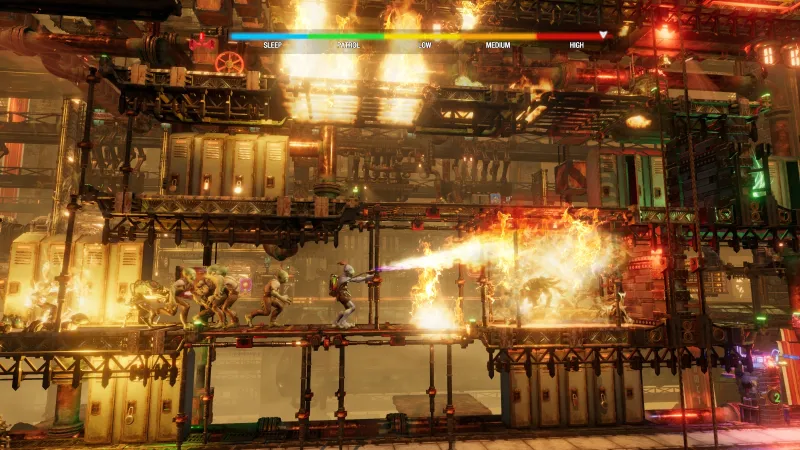PlayStation 4, PC
Playing Oddworld: Soulstorm is as arduous as Abe’s quest to liberate his Mudoken brethren from slavery. Each step is a supreme test of patience as you methodically guide your followers through challenging hazards, sweating over the fact that one slip-up could unravel all your effort. If you enjoy putting up with that old-school challenge, you might love this journey. However, if you’re a newcomer or a fan that believes this style of platformer hasn’t aged very well, turn back now. Soulstorm doesn’t do enough to modernize the series’ tedious gameplay, and a litany of severe technical hiccups spoil Abe’s attempted comeback.
A reimagining of Oddworld: Abe’s Exoddus, Soulstorm’s gameplay remains largely the same: you recruit and guide followers through 2D platforming stages littered with dangers. As charming as the classic Oddworld games are, they can be frustratingly difficult and that hasn’t changed much in Soulstorm. Most Slig enemies and other hazards mow Abe down instantly, and I was infuriated by how little wiggle room I had to correct course when things went sideways. Abe drops so fast that it makes the health meter seem like a cruel tease. While playing Soulstorm, I often felt like I was walking on eggshells because of that high price of failure, retracing every step, re-recruiting every Mudokon, and carefully guiding them through a gauntlet of foes is soul-crushing when it all falls apart in seconds. Dying to unexpected perils, like being suddenly gunned down by off-screen enemies, feels cheap and happens way too often.
Click here to watch embedded media
A crafting system serves as Soulstorm’s biggest addition, but it doesn’t feel necessary. You must repeatedly gather the same ingredients every time you die (by searching lockers, trash cans, and fallen foes), which wore me down in a hurry after repeatedly replaying certain sections. The crafted tools themselves, like proximity mines, smoke screens, even a flamethrower, do add a welcomed element of flexibility and improvisation to gameplay. Dropping smoke screens to create hiding spots anywhere is nice, but I wished I didn’t have to make these items myself and grew tired of digging around the same spots over and over.
Even when Soulstorm’s difficulty eases up, the gameplay is bland. The action feels largely the same from previous games in the series, and that formula doesn’t evolve significantly beyond the first few hours. Even the more interesting sequences, like facing down a giant mech aboard a speeding train, are far too punishing to be fun. I’m glad that Abe controls better now (he even has a double jump), but the controls still have a mushy unresponsiveness that makes entertaining actions, like possessing Sligs, feel like a hassle. The controls also lead to additional deaths because Abe doesn’t act as swiftly as you need him to, especially during the ill-fitting, overly demanding combat arenas that pit you against waves of baddies while you try to protect fleeing Mudokens.

Soulstorm would be a tough recommendation for anyone outside of diehard fans, but I encountered several progress-sabotaging bugs (even after installing the big day-one patch) that should scare off even those players. When I died, Mudokens sometimes failed to respawn alongside me even though my tally indicated they were still alive and under my command. That meant I lost out on turning in followers that I’d spent ages trying to safely liberate, which negatively affected my overall quarma – a vital metric in determining which of the four endings you get.
Abe occasionally gets stuck in environmental geometry, forcing a restart. At one point, I fell into an infinite loop. One escape portal permanently vanished once I reached it, forcing me to abandon followers. A gun in a late-game turret sequence failed to shoot despite working fine in previous segments. After multiple restarts, I randomly discovered that clicking the right stick “fixed” the weapon for some reason, allowing it to fire. I spent over an hour trying to lead a large group of followers through a particularly challenging area, but once I opened the exit door an invisible wall prevented me from moving forward. I was forced to restart this entire, lengthy sequence twice before the exit worked properly. Soulstorm’s gameplay pushed my patience to its limits, but these bugs sent me over the edge and made me nervous every time I started a new level. “What on Earth is going to screw me over this time?” I regularly asked myself.
Soulstorm’s faults are a shame because its narrative and presentation brought a smile to my face. Abe and his pals are goofy, delightful underdogs I couldn’t help but root for. The enjoyable story is packed with heart, and the cutscenes look great. I wanted to welcome Abe into a new generation of gaming with open arms, but Soulstorm fails to make a case for why its brand of cinematic platforming works today. In fact, Soulstorm only reaffirmed that Abe’s past adventures are best viewed with rose-colored glasses.

Score: 5
Summary: Soulstorm retains the series’ signature charm, but it’s not enough to forgive its tedious and dated design as well its litany of swear-inducing technical issues.
Concept: Help Abe liberate his fellow Mudokons from Glukkon tyranny while unraveling the truth behind his own destiny
Graphics: The CG cutscenes look great, and I love seeing the camera pan out while dozens of Mudokons scurry in the background
Sound: This voice-acting remains charming and humorous, but the soundtrack is unremarkable
Playability: The platforming feels much better when compared to New ‘n’ Tasty, but these controls are still stiff and clunky and can cost you your life against the quick-drawing enemies
Entertainment: Soulstorm has oodles of charm, but tedious design and annoying bugs make an experience that only the most hardcore and forgiving Oddworld fans might enjoy
Replay: Moderately Low
